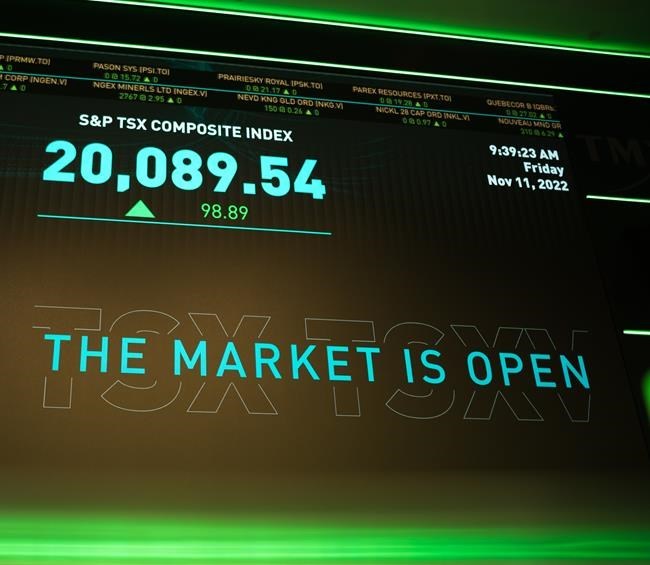MONTREAL — The second quarter kicked off with a bang Monday after a spike in oil prices boosted Canada’s main stock index by nearly 180 points, even as fears of further inflation and a looming recession grew.
The S&P/TSX composite index closed up 178.39 points at 20,278.28.
The jump came after major oil-producing countries led by Saudi Arabia said they were cutting supplies of crude. The announcement Sunday by producers in the OPEC plus cartel that they would cut production by more than one million barrels a day came as a surprise and underlined worries about where the global economy might be headed.
In theory, less oil flowing to refineries should mean higher gasoline prices for drivers and could boost inflation in Canada, the U.S. and Europe.
That concern registered on New York’s Nasdaq composite index Monday, which closed the day down 32.45 points at 12,189.45. The S&P 500 index inched up 15.20 points to 4,124.51, while the Dow Jones industrial average rose 327 points to 33,601.15.
“For Canada, it's certainly a positive given that energy stocks are a big part of the Canadian marketplace,” said Anish Chopra, managing director with Portfolio Management Corp.
“But this makes the Federal Reserve's fight against inflation more challenging, with oil output cuts and the price of oil going up. That'll feed into inflation, which could feed into higher rates,” he said in a phone interview.
“Higher rates tend not to be great for technology shares.” Hence the dip Monday on the Nasdaq composite, which is heavy in tech stocks. North of the border, the technology index had fallen slightly as well.
The Bank of Canada and the U.S. Federal Reserve have already increased rates at a feverish pace over the past year in hopes of undercutting high inflation. Higher rates can achieve that by slowing the economy, but they risk causing a recession down the line.
A further boost to the energies and metals sectors Monday came from Teck Resources Ltd., which said it had rejected an unsolicited takeover offer from Swiss mining giant Glencore. “That's also driving the performance of the TSX on the commodities side,” Chopra said.
More broadly, the wobbly economic environment is already apparent in sputtering manufacturing output and job losses at tech firms, he said.
Canadian manufacturing activity slumped last month to its lowest level since June 2020 after two months of growth, as output and new orders fell amid economic uncertainty, according to new data from S&P Global. The S&P/TSX composite saw the industrials sector slide Monday.
In the U.S., manufacturing activity in March hit its lowest level in nearly three years, with the possibility for further decreases ahead, according to an Institute for Supply Management survey.
The news from OPEC on Sunday fanned fears about stubbornly high inflation triggering further rate hikes and an eventual recession.
That angst had already increased last month as the second- and third-largest U.S. bank failures in history had depositors rushing to pull their money out of Silicon Valley Bank and Signature Bank.
Worries over “contagion,” and the possibility of wider-spread bank failures, spurred a continent-wide market selloff earlier in March. Crude oil also took a nosedive over fears that the overall economy was in jeopardy.
Oil, which is still down significantly from the heights reached last June, built on a rally last week with the benchmark West Texas Intermediate rising more than six per cent Monday.
The May crude contract was up US$4.75 at US$80.42 per barrel and the May natural gas contract was down 12 cents at US$2.10 per mmBTU.
The Canadian dollar traded for 74.42 cents US compared with 73.89 cents US on Friday.
The June gold contract was up US$14.20 at US$2,000.40 an ounce and the May copper contract was down five cents at US$4.05 a pound.
This report by The Canadian Press was first published April 3, 2023.
Companies in this story: (TSX:GSPTSE, TSX:CADUSD=X, TSX:TECK.B)
— With files from The Associated Press
Christopher Reynolds, The Canadian Press




